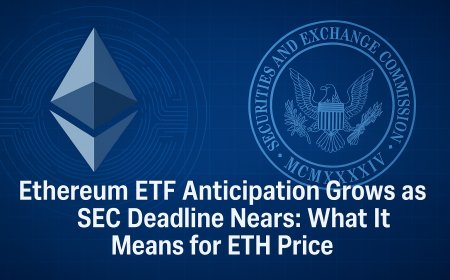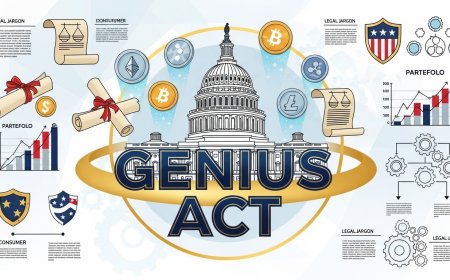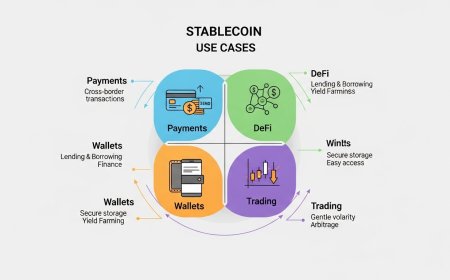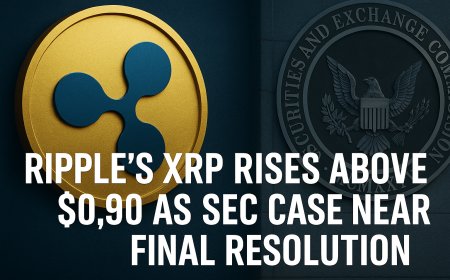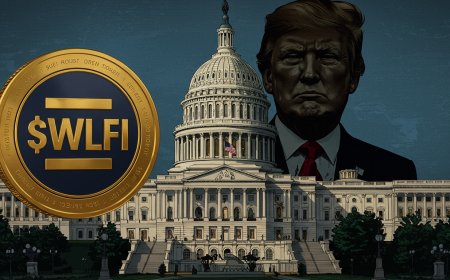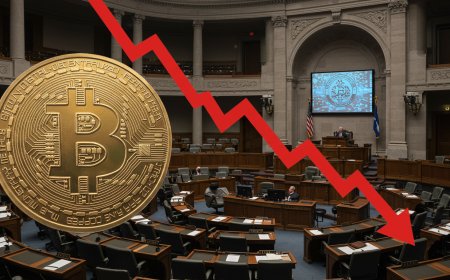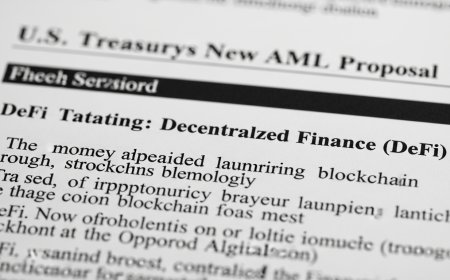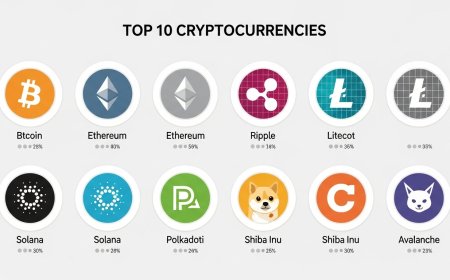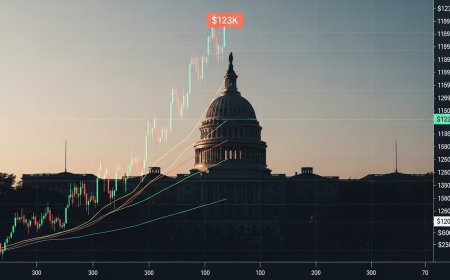Senate to Consider Crypto Market Structure Bill as Regulation Debate Heats Up
The U.S. Senate is set to debate a new bipartisan bill aimed at regulating the cryptocurrency market structure. If passed, the legislation could reshape how digital assets are classified, traded, and taxed in the U.S., with major implications for exchanges, DeFi protocols, and investors. The Senate will debate a groundbreaking crypto market structure bill in 2025. Learn how this regulation could impact exchanges, DeFi, and investor protections.

📰 Senate to Consider Crypto Market Structure Bill as Regulation Debate Heats Up
Washington, D.C. — July 23, 2025 — In a pivotal move for the cryptocurrency industry, the U.S. Senate will soon deliberate on a long-awaited bipartisan bill designed to provide a clear regulatory framework for digital assets and decentralized finance (DeFi). Known as the Crypto Market Structure Bill, the legislation seeks to clarify the jurisdictional roles of the Securities and Exchange Commission (SEC) and the Commodity Futures Trading Commission (CFTC), offering long-sought clarity on how digital tokens should be classified and regulated.
The bill, co-authored by Senators Kirsten Gillibrand (D-NY) and Cynthia Lummis (R-WY), proposes a comprehensive set of rules that will significantly impact centralized exchanges, decentralized platforms, stablecoins, and crypto investment firms.
“This is a historic step toward regulatory clarity,” said Senator Lummis. “We’re building a bridge between innovation and investor protection.”
🧾 What the Crypto Market Structure Bill Proposes
The draft of the bill — which stretches over 250 pages — focuses on three primary areas:
1. Digital Asset Classification
Tokens will be clearly defined as securities or commodities based on decentralization, functionality, and level of control by founding entities.
A new test, called the Digital Asset Purpose & Usefulness (DAPU) framework, would be introduced to assess token utility.
2. DeFi Compliance & Registration
DeFi protocols offering financial services (like lending or derivatives) must implement know-your-customer (KYC) protocols and risk disclosures.
Protocols reaching a certain threshold of daily active users or Total Value Locked (TVL) will need to register with either the CFTC or SEC.
3. Exchange Oversight
Centralized exchanges must register with regulators and meet strict operational, cybersecurity, and reporting standards.
Cross-border trading, wash trading, and token listing procedures will be subjected to more transparent auditing mechanisms.
🛡️ Impact on the Crypto Industry
If passed, the bill would mark the largest shift in U.S. crypto policy since 2018 and potentially reshape the market structure for years to come. Here’s how:
🏛️ Exchanges
Platforms like Coinbase, Kraken, and Binance.US would need to restructure their compliance and listing procedures.
Token transparency and third-party audits will be mandatory before listing.
🌐 DeFi Projects
Popular protocols such as Uniswap, Aave, and Curve Finance may face tough choices: comply with KYC standards or restrict access to U.S. users.
Protocols that implement on-chain compliance layers (like KYC pools) may gain favor.
💰 Investors
Retail investors will gain stronger protections, including fraud alerts, asset insurance disclosures, and custody mandates.
Institutional players may increase allocations due to clearer legal pathways and risk minimization.
📈 Market Reactions
Immediate Price Moves
Following the announcement, crypto markets remained relatively stable, with slight upticks across large-cap assets:
Bitcoin (BTC): +1.8% on the day
Ethereum (ETH): +2.4%
Chainlink (LINK) and Lido DAO (LDO), key DeFi tokens, surged by 5% and 6.7%, respectively.
Long-Term Expectations
Market analysts predict:
Short-term volatility due to legal uncertainty during debates
Mid-term bullishness driven by institutional capital inflows if the bill passes
Greater project scrutiny, especially in DeFi, leading to ecosystem reshuffling
“Clarity breeds confidence,” said Fidelity Digital Assets. “This is the catalyst traditional finance has been waiting for.”
🕰️ Historical Context: A Decade of Regulatory Gridlock
Since the launch of Bitcoin in 2009, the U.S. has grappled with how to classify and regulate digital assets. The SEC vs. Ripple (XRP) lawsuit in 2020 marked a turning point, with courts beginning to weigh in on whether tokens constituted unregistered securities. Meanwhile, the CFTC maintained that cryptocurrencies like Bitcoin and Ethereum were commodities.
Despite growing adoption, no single law had clearly delineated which agency holds ultimate authority. This confusion stifled innovation and discouraged institutions from investing heavily in the space.
“For the last 10 years, we’ve had regulatory agencies fighting over turf instead of providing a roadmap for crypto companies,” said Carol Yoon, a legal expert specializing in fintech law.
The result has been fragmented enforcement. The SEC brought over 130 enforcement actions against crypto companies between 2020 and 2024, while the CFTC’s jurisdiction remained murky. The industry cried foul, labeling the situation “regulation by enforcement.”
The new Crypto Market Structure Bill aims to correct that imbalance by codifying a clear framework.
⚖️ Legal Experts Weigh In
Reactions from the legal community have been mixed but largely optimistic.
📢 Proponents:
Jake Chervinsky, Chief Legal Officer at Variant Fund:
“This bill is the first serious legislative effort that balances innovation and compliance. It would put the U.S. ahead of Europe and Asia.”
Angela Walch, Professor of Law at St. Mary's University:
“The proposed registration mechanism for DeFi is groundbreaking — if difficult to enforce in practice. But it's a start.”
⚠️ Critics:
Coin Center and Blockchain Association raised concerns about overreach into DeFi, arguing that decentralized protocols cannot easily comply with centralized regulations.
Privacy advocates criticized the KYC requirements for DeFi, saying it could undermine the pseudonymous nature of blockchain.
🌍 How the U.S. Bill Compares Globally
The U.S. isn't alone in tackling crypto regulation. Here's how this bill stacks up against frameworks from other major jurisdictions:
Country/Region Regulatory Framework Focus Areas
🇪🇺 European Union MiCA (Markets in Crypto Assets) Stablecoins, licensing, asset categorization
🇸🇬 Singapore Payment Services Act AML/KYC, stablecoins, exchange regulation
🇯🇵 Japan PSA & FIEA Custody, AML, consumer protection
🇧🇷 Brazil Law 14.478 (2022) Asset classification, tokenization
🇺🇸 United States Pending Crypto Bill Asset definition, DeFi oversight, exchange rules
The Crypto Market Structure Bill is more expansive than MiCA in some areas, especially in how it tackles DeFi, commodities vs. securities, and investor protection.
“This bill could position the U.S. as a global leader in crypto regulation — but only if it's passed in a timely manner,” said Mariana de Souza, policy analyst at the World Blockchain Forum.
🔐 Stablecoins, CBDCs, and the Future of Digital Finance
Another key feature of the bill is its treatment of stablecoins.
Issuers will need to register and disclose reserve holdings.
Fully backed assets must be audited monthly.
Algorithmic stablecoins, like UST (now defunct), would be subject to heightened scrutiny or bans.
The bill also opens the door for regulated tokenized U.S. dollars and CBDC trials, which would coexist with private stablecoins.
Meanwhile, it lays the groundwork for crypto taxation reform, by:
Setting a $200 de minimis exemption for personal crypto transactions
Defining crypto staking and airdrop rewards as income at fair market value
💬 Industry Reaction: Mixed but Hopeful
Crypto companies and Web3 startups have cautiously welcomed the bill:
Brian Armstrong, CEO of Coinbase:
“Clarity is good. Compliance is doable — what we need is consistency and finality.”
Hayden Adams, Uniswap Founder:
“Regulating DeFi like banks misses the point of decentralization. But this bill is a conversation starter.”
Circle, issuer of USDC, expressed support for the stablecoin guidelines.
The Crypto Council for Innovation and the Chamber of Digital Commerce issued joint statements urging bipartisan support to avoid another year of legislative limbo.
🔮 What Happens Next?
The bill will now move through the Senate Banking Committee, where it may face opposition from members wary of crypto’s volatility and role in illicit finance. A companion bill in the House of Representatives is expected to be introduced within weeks.
Analysts predict several possible outcomes:
Scenario Probability Outcome
Clean passage before 2026 40% Markets rally; major inflows to compliant firms
Amended version with compromises 35% Gradual compliance; stablecoin carve-outs
Failure to pass 25% Renewed enforcement-by-agency; market unease
“It’s a watershed moment for crypto policy,” said Sheila Warren of the Crypto Council. “Either we lead — or we get left behind.”
💼 What This Means for DeFi and Web3
If this bill becomes law, the DeFi landscape could change dramatically:
Anonymous participation may decline, replaced by verified access points and “DeFi wrappers” for compliance.
DAOs may need to register as legal entities.
DeFi aggregators (like Yearn Finance, Instadapp) could act as regulated intermediaries.
But there’s also opportunity: protocols that adapt early may thrive. Compliance layers, zero-knowledge KYC, and permissioned DeFi may become new industry standards.
📢 Final Thoughts
This Senate bill could become the most influential piece of crypto legislation in U.S. history. It brings long-awaited clarity, but also raises difficult questions about privacy, decentralization, and the future of financial freedom.
As the bill heads to the floor, all eyes are on Washington. Whether you're an investor, developer, or policymaker — the future of crypto regulation starts now.
🧭 Call to Action
Stay informed:
Subscribe to CryptoFortress for real-time coverage of the bill’s progress, key amendments, and implications for every part of the crypto industry.
Join the conversation:
Follow @CryptoFortress_ on X and let us know — should DeFi be regulated like TradFi?
What's Your Reaction?
 Like
1
Like
1
 Dislike
0
Dislike
0
 Love
0
Love
0
 Funny
0
Funny
0
 Angry
0
Angry
0
 Sad
0
Sad
0
 Wow
0
Wow
0









